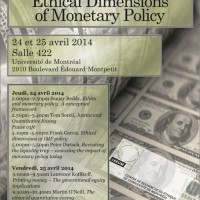
Ethical dimensions of monetary policy
2910 Boulevard Edouard-Montpetit
Université de Montréal, Montréal, QC H3T 1J7
Canada
Workshop at the Centre de recherche en éthique de l’Université de Montréal (CRÉUM)
Monetary policy is largely driven by considerations of inflation and, to some extent, unemployment and economic growth. Some central banks, like the ECB, have a mandate focused exclusively on keeping in check inflation whereas others, like the FED, have a double-mandate balancing the objectives of controlling inflation and limiting unemployment.
While both monetary theory and policy focus on these economic dimensions, a number of normative implications do not receive adequate attention. Monetary policy both has distributive consequences and raises questions of self-determination and monetary sovereignty in an international context. When central banks set interest rates or conduct open-market operations, should they take these considerations into account and, if so, how?
This workshop aims to investigate the normative dimensions of monetary theory and policy. To do so, it brings together political philosophers working on economic issues, economists, and political scientists working on political economy.
To give participants a more concrete idea of the orientation of the workshop, here is a tentative categorisation of the issues to be discussed. Note that this list is not meant to be exhaustive:
1) The distributive effects of national monetary policy
Inflation benefits debtors by reducing the real value of what they owe. Who benefits from low inflation combined with very low interest rates, as we have experienced in recent years? Even if a principled answer to this question might be difficult to come by, because it is contingent on other policy issues like for instance the regulation of financial markets, providing some conditional answers is key to laying out the conceptual landscape of monetary policy.
2) What are the monetary policy prerogatives of the state?
When the central bank of one country changes its interest rate, the resulting effects on capital flows and its exchange rate mean that individuals in other states are also affected. Are there any obligations that the central bank of state A has towards the citizens of state B in setting its monetary policy? If so, what are they, and how should they be enforced?
3) What are the normative implications of monetary policy as crisis management?
In response to the financial crisis that started in 2008, central banks have explored unknown territory in pursuing their policy objectives. To take one important example, they have used so-called quantitative easing to promote liquidity and bank lending in a situation where interest rates could not be lowered any further. What are the economic and social implications of these policies? While this question overlaps with the previous two categories, it puts them in the specific context of the financial crisis.
Participants:
– Frank Garcia, law, Boston College Law School
– Aaron James, philosophy, University of California at Irvine
– Laurence Kotlikoff, economics, Boston University
– Pierre Monnin, economics, Council on Economic Policies
– Martin O’Neill, political science, York University, England
– Sanjay Reddy, economics, New School, New York
– Tom Sorell, philosophy & political science, Warwick University, England
– Peter Dietsch, philosophy, Université de Montréal
Preliminary schedule:
Thursday, April 24th
2.00pm – 2.50pm Sanjay Reddy, Ethics and monetary policy: A conceptual framework
2.50pm – 3.40pm Tom Sorell, Justice and Quantitative Easing
coffee
4.10pm – 5.00pm Frank Garcia, Ethical dimensions of IMF policy
5.00pm – 5.50pm Peter Dietsch, Revisiting the liquidity trap – assessing the impact of monetary policy today
dinner at 7pm
Friday, April 25th
9.00am – 9.50am Laurence Kotlikoff, Printing money – The generational equity implications
9.50am – 10.40am Martin O’Neill, The ethics of quantitative easing
coffee
11.00am – 11.40am Pierre Monnin, Inflation and income inequality in developed economies
11.40am – 12.30pm Aaron James, Distributive consequences of monetary policy
lunch
Format: 20-30 minutes presentation + 20-30 minutes discussion. The workshop will be open to the public.
Organisé par Pieter Dietsch.



